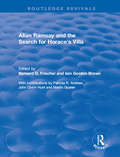- Table View
- List View
Allaire (Images of America)
by Hance Morton SitkusAllaire traces the history and culture of the village from its days as a famous nineteenth-century industrial community to one of today's most popular living history museums in New Jersey. In 1822, James P. Allaire established the Howell Works, one of many bog-iron furnaces that once dotted the New Jersey Pine Barrens. Explored are the rise and fall of the industrial community, as well as the village's transition from the Allaire family to Arthur Brisbane, a famous Hearst newspaper editor. Also included are the early restoration efforts of Allaire Village and some familiar sites on the outskirts of Allaire, including Kessler Farms, Thompson's Dairy Farm, the Pine Creek Railroad, DeLisle's French Restaurant, and Allaire Airport. In 1836, more than three hundred people lived and worked at Howell Works, a self-sufficient community once complete with thirty buildings. The collapse of the bog-iron industry in the late 1840s left the village crumbling and nearly deserted by 1900. In 1907, on a leisurely drive from his Lakewood mansion, Arthur Brisbane bought Allaire Village. Revitalizing it, he created a luxurious country estate. Allaire contains images of the Allaire Inn, Brisbane's model farm, and the Boy Scouts' Camp Burton. During the 1900s, Allaire was home to the legendary Indian Joe, the Pennsylvania Railroad's doodlebugs, and Brisbane's full-time staff-the Macauley, Frostick, Service, and Reynold families.
Allan King's A Married Couple
by Zoe DruickLong before 'Reality TV,' Canadian filmmaker Allan King caused a stir by mixing people's private and public lives in his 1969 documentary A Married Couple. This observational cinema piece, which took an unscripted look at the urban Edwards family, was deemed too contentious to air by commissioning network CTV on the grounds of excessive nudity and obscenity. Nevertheless, the documentary was accepted by the Cannes festival, and it is now cited as a milestone in realist filmmaking.In Allan King's A Married Couple, Zoë Druick examines the film in the context of late 1960s cinematic and cultural movements. Through a scene-by-scene synopsis and an analysis of contemporary responses to the piece, she traces A Married Couple's influence on documentary and Canadian filmmaking. The fifth volume in the Canadian Cinema series, this work is an accessible and engaging introduction to a controversial film and its fascinating director.
Allan Maclean, Jacobite General: The life of an eighteenth century career soldier
by Mary Beacock FryerBorn on the Isle of Mull to an impoverished lair of the clan Maclean, young Allan fought his first battle — for Bonnie Prince Charlie at Culloden — from a sense of deep conviction and family loyalty. He fled into exile when the Stuart cause was lost. In Holland he became a mercenary, and after amnesty was granted for Jacobites, he joined the British army serving in North America during the Seven Years’ War, and again during the American Revolution. He was at Quebec on New Year’s Eve 1775 when the city was attacked by Benedict Arnold, and shortly thereafter become the military governor of Montreal. Between the two wars, when the army was reduced and he was on half-pay, Maclean was preoccupied with finding ways to meet the expenses he incurred while on active service. He made himself useful to politicians and office-holders who had access to public funds or who could recommend him for promotions. One who helped him was Lauchlin Macleane, an ambitious politician who was probably the notorious Junius, who wrote vicious letters to newspapers attacking the government, but was never unmasked. This fast-paced and intriguing book gives a penetrating insight into the challenges facing a man who chose a military career during the tumultuous period of the eighteenth century.
Allan Pinkerton (Outlaws and Lawmen of the Wild West)
by Carl R. Green William R. SanfordBiographies of famous and infamous men of the Western frontier. - Entices the reluctant reader to relive the exciting days of the Wild West.
Allan Quatermain
by H. Rider HaggardSir Henry Rider Haggard was a writer of adventure novels set in exotic locations, predominantly Africa and a pioneer of the Lost World literary genre. <P> <P> His stories, situated at the lighter end of Victorian literature, continue to be popular and influential. Allan Quatermain is the protagonist of H. Rider Haggard's 1885 novel King Solomon's Mines and its sequels. In King Solomon's Mines, Haggard introduces the reader to Allan Quatermain, now one of the most famous literary adventure characters. Second in the series, this book, Allan Quatermain, continues the story of this daring man and chronicles in first person (and through correspondence from some of his fictitious companions) his adventures in Africa. Thought to be one of the fictional characters upon which another such person, Indiana Jones, is based, Quatermain is nevertheless a humble man. By his own definition, he is an . " . . 'Adventurer' -- he that goes out to meet whatever may come. Well, that is what we all do in the world one way or another . . . "
Allan Quatermain #10: The Ancient Allan
by H. Rider HaggardBefore there was Indiana Jones there was Allan Quartermain: the original explorer, treasure hunter, and adventurer. The Quartermain books have captivated readers for more than a century, spawning more than a dozen movies and a host of imitators. Join Allan as he relives his past lives with the help of the Holy Flower he discovered in Africa
Allan Quatermain #1: King Solomon's Mines
by H. Rider HaggardBefore there was Indiana Jones there was Allan Quartermain: the original explorer, treasure hunter, and adventurer. The Quartermain books have captivated readers for more than a century, spawning more than a dozen movies and a host of imitators. Thrill with Allan as he discovers the mythical King Solomon's Mines and their not-so-mythical curse. These are adventure stories in the grandest tradition.
Allan Quatermain #2: Allan Quatermain
by H. Rider HaggardAfter discovering the hidden mines of King Solomom, Allan Quartermain finds that life back in England is too sedate for his liking. With two travel companions he heads back to Africa in search of further adventure. Teaming up with a valiant warrior and a timid French chef, they enter the land of Paradise, Zu-Vendis. But paradise is not without its dangers, and Allan and his band find themselves at odds with the two beautiful sisters who rule Zu-Vendis. A struggle is imminent--who will emerge the victor?.
Allan Quatermain #3: Allan's Wife
by H. Rider HaggardBefore there was Indiana Jones there was Allan Quartermain: the original explorer, treasure hunter, and adventurer. The Quartermain books have captivated readers for more than a century, spawning more than a dozen movies and a host of imitators. In this, the third Quartermain book, we get a more personal glimpse into the life of a legend!
Allan Quatermain #4: Maiwa's Revenge
by H. Rider HaggardBefore there was Indiana Jones there was Allan Quartermain: the original explorer, treasure hunter, and adventurer. The Quartermain books have captivated readers for more than a century, spawning more than a dozen movies and a host of imitators. In this the fourth Quartermain book we watch with Allan as a Zulu Woman takes her revenge!
Allan Quatermain #5: Marie
by H. Rider HaggardBefore there was Indiana Jones there was Allan Quartermain: the original explorer, treasure hunter, and adventurer. The Quartermain books have captivated readers for more than a century, spawning more than a dozen movies and a host of imitators. Here is the story of Allan's first true love, Marie Marais.
Allan Quatermain #6: Child of Storm
by H. Rider HaggardBefore there was Indiana Jones there was Allan Quartermain: the original explorer, treasure hunter, and adventurer. The Quartermain books have captivated readers for more than a century, spawning more than a dozen movies and a host of imitators. This is the second novel featuring the beautiful but deadly Zulu woman, Mameena: the child of storm.
Allan Quatermain #7: Allan and the Holy Flower
by H. Rider HaggardBefore there was Indiana Jones there was Allan Quartermain: the original explorer, treasure hunter, and adventurer. The Quartermain books have captivated readers for more than a century, spawning more than a dozen movies and a host of imitators. Join Allan as he searches for rare orchids in Africa and finds something more!
Allan Quatermain #8: Finished
by H. Rider HaggardBefore there was Indiana Jones there was Allan Quartermain: the original explorer, treasure hunter, and adventurer. The Quartermain books have captivated readers for more than a century, spawning more than a dozen movies and a host of imitators. In Finished, an evil Zulu wizard brings about the downfall of the Zulu nation!
Allan Quatermain #9: The Ivory Child
by H. Rider HaggardBefore there was Indiana Jones there was Allan Quartermain: the original explorer, treasure hunter, and adventurer. The Quartermain books have captivated readers for more than a century, spawning more than a dozen movies and a host of imitators. Join Allan in The Ivory Child as he undertakes the strangest adventure of his life battling the giant elephant god.
Allan Quatermain: Allan Quatermain 14 (Allan Quatermain #Vol. 14)
by H. Rider HaggardThe heroes of King Solomon&’s Mines return to Africa in this action-packed sequel that inspired the film Allan Quatermain and the Lost City of Gold. Allan Quatermain, big-game hunter and explorer, has recently lost his son, Harry, to smallpox and is ready to get away from civilization. Rather than continue to wallow in grief surrounded by his trophies and guns in England, he instead chooses adventure and journeys to eastern Africa with his friends, Sir Henry Curtis and Capt. John Good. With Zulu chief Umslopogaas accompanying them, they head to uncharted territory in search of the Zu-Vendis, a race of white-skinned people rumored to be isolated from the other tribes of Africa and ruled by two beautiful sister queens. There, the travelers confront angry Zu-Vendi priests who admonish the men for killing their sacred hippopotamuses—and Curtis unwittingly becomes part of a tumultuous love triangle with the sister queens. Soon, the party of adventurers finds themselves embroiled in a civil war. Each queen is now vying for the throne, but only one faction will win—and not everyone will survive.
Allan Quatermain: Second Of The Quatermain Novels (Classics To Go)
by H. Rider HaggardSir Henry Rider Haggard was an English writer of adventure novels set in exotic locations, predominantly Africa, and the creator of the Lost World literary genre. His stories, situated at the lighter end of the scale of Victorian literature, continue to be popular and influential. He was also involved in agricultural reform and improvement in the British Empire. Haggard wrote the book over his summer holiday in 1885 immediately after King Solomon's Mines. At the beginning, Allan Quatermain has lost his only son and longs to get back into the wilderness. Having persuaded Sir Henry Curtis, Captain John Good, and the Zulu chief Umslopogaas to accompany him, they set out from the coast of east Africa into the territory of the Maasai. While staying with a Scottish missionary, Mr. Mackenzie, they are attacked by a Maasai group, whom they overcome heroically. They travel by canoe along an underground river to a lake (which turns out to be the sacred lake of Zu-Vendis) in the kingdom of Zu-Vendis beyond a range of mountains. The Zu-Vendi are a warlike race of white-skinned people isolated from other African races; their capital is called Milosis. At the time of the British party's arrival, they are ruled jointly by two sisters, Nyleptha and Sorais. The priests of the Zu-Vendi religion are hostile to the explorers as they had killed hippopotamuses — animals sacred to the Zu-Vendis — on their arrival, but the queens protect them. (Excerpt from Wikipedia)
Allan Quatermain: The Zulu Trilogy
by H. Rider HaggardBefore there was Indiana Jones there was Allan Quartermain: the original explorer, treasure hunter, and adventurer. The Quartermain books have captivated readers for more than a century, spawning more than a dozen movies and a host of imitators. These three novels-Marie, Child of Storm, and Finished-form the Zulu Trilogy in which the Zulu wizard, Zikali, gains his revenge on the Zulu nation and its king, Cetawayo. Here are tales of magic, revenge, and something darker and far more sinister.
Allan Ramsay and the Search for Horace's Villa (Routledge Revivals)
by Ian Gordon BrownThis title was first published in 2001. This volume contains Allan Ramsay's "Enquiry into the Situation and Circumstances of Horace's Sabine Villa". It also features essays about Ramsay, Jacob More, Jacob Philipp Hackert, the garden and country house in 18th-century British thought, and the archaeology of the Licenza Valley. The aims of the editors are three-fold: to print the text as Ramsay would have wished to, had he been able; to publish the related illustrations by Hackert, More and Ramsay; and to provide some basic background facts and commentary. They hope to help the contemporary reader understand the antiquarian context in which Ramsay was writing and to appreciate Ramsay's contribution to our understanding of the site conventionally known as Horace's Villa.
Allan and the Holy Flower (Classics To Go)
by H. Rider HaggardSir Henry Rider Haggard was an English writer of adventure novels set in exotic locations, predominantly Africa, and the creator of the Lost World literary genre. His stories, situated at the lighter end of the scale of Victorian literature, continue to be popular and influential. He was also involved in agricultural reform and improvement in the British Empire. “Allan and the Holy Flower” is a 1915 novel by H. Rider Haggard featuring Allan Quatermain. The plot involves Quatermain going on a trek into Africa to find a mysterious flower. (Excerpt from Wikipedia)
Allan and the Ice-Gods (Classics To Go)
by H. Rider HaggardThis novel is the final volume of the Allan Quatermain saga, and it comprises the fourth part of a loosely linked series begun with Allan and the Holy Flower. Once more Quatermain takes the hallucinogenic taduki drug, as he did in previous novels, and he finds himself reliving as Wi, an civilised man living in the barbaric ice age as part of a clan of cavemen. (Goodreads)
Allan's Wife
by H. Rider HaggardHenry Rider Haggard was a British Victorian writer known for his adventure novels set is exotic places. His writings are sympathetic to the natives. <P> <P> He often portrayed Africans as heroic in his stories even though the main characters are usually European. Allan's Wife is part of the Allan Quartermain series. Alan Quartermain was the main character in the novel King Solomon's Mines. He also appears in several sequels including Marie and the novel She which paired Quartermain with another Haggard character favorite Ayesha. . Quartermain was a progressive Victorian. He was a big game hunter in Africa who championed the cause of the natives.
Allan's Wife (Classics To Go)
by H. Rider HaggardSir Henry Rider Haggard was an English writer of adventure novels set in exotic locations, predominantly Africa, and the creator of the Lost World literary genre. His stories, situated at the lighter end of the scale of Victorian literature, continue to be popular and influential. He was also involved in agricultural reform and improvement in the British Empire. “Allan's Wife” - the story of Quartermain's early life, and his marriage to childhood sweetheart, Stella, mother of his son Harry. (Excerpt from Wikipedia)
Allan, Burning: A Novel
by Donald Everett AxinnHappily married with two beautiful children, successful architect and avid amateur aviator Allan Daniels finds his life plummeting into a nightmare when his wife suddenly announces that she wants a separation, maybe a divorce. Then, two days later, as he is piloting a seaplane from Long Island to Key West, the engine of his Cessna 185 seaplane sputters, then quits. Daniels's resolute skills as a pilot enable him to land safely in the Everglades, where a disheveled Miccosukee man named Tommy Handley finds him. But while Handley turns out to be from the same tribe as Daniels's mother, he also turns out to be a fugitive from justice, hiding out and evading capture in the protection of the remote swamps. When Daniels wakes in the middle of the night to find Handley groping for his wallet, Daniels defends himself--but accidentally kills his rescuer, then flees in his boat, from which locals later rescue him again. Daniels's explanation of what happened in the swamp doesn't sit well with savvy local lawman Sheriff Haskins, who suspects that Daniels is hiding something--but what? When Daniels finally confesses his guilt, it will set off a whole new chain of dire events in this fast-paced novel with enough twists and turns to keep you guessing until the final page.
Allapattah: A Novel
by Patrick D. SmithTwenty-five-year-old Seminole Toby Tiger lives in despair in the Florida Everglades. He loves the land and everything that exists in the natural world: the deer and egrets, turtles and herons, cypress trees and sawgrass, ponds and marshes, and, most of all, Allapattah, the crocodile. He watches helplessly as the white man imposes his will on the Seminoles, forcing them either to conform or to eke out a living wrestling alligators and carving trinkets for tourists. According to Toby, the whites &“destroy all that they touch." Toby refuses to bend to the white man's will and fights back the only way he knows how. He becomes Allapattah, a creature that earns his respect and protection.
























